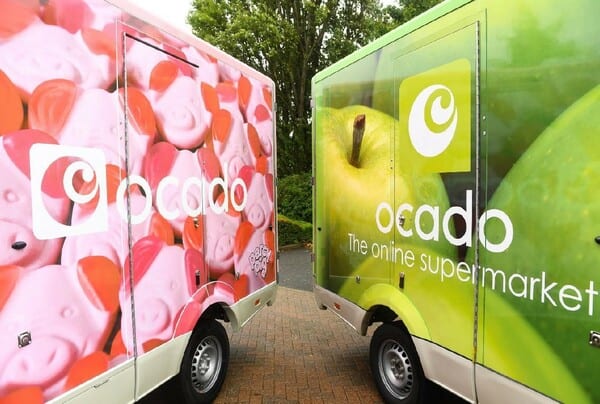Ocado is looking ahead to robotic in-kitchen deliveries as it takes a £10m stake in autonomous vehicle specialist Oxbotica.
The grocer-cum-technology company says today that last mile deliveries and kerb-to-kitchen robots are among the options for a partnership that will collaborate on both hardware and software interfaces for autonomous vehicles. Use cases also include vehicles to work inside Ocado’s customer fulfilment centres (CFC).
From there, the autonomous vehicles that are developed will be integrated into the Ocado Smart Platform, which it uses to run its own grocery business in partnership with M&S as well as online operations for third-party retailers. The ultimate aim, says Ocado Group, is to enable its partners to cut the cost of last-mile delivery and other logistics operations.
Alex Harvey, chief of advanced technology at Ocado, says: “We are excited about the opportunity to work with Oxbotica to develop a wide range of autonomous solutions that truly have the potential to transform both our and our partners’ CFC and service delivery operations, while also giving all end customers the widest range of options and flexibility.”
The path to autonomous deliveries
Ocado has been working with Oxbotica since 2017, when they trialled autonomous deliveries using an early prototype in Greenwich, London.
Now teams of Ocado engineers in its advanced technology division will work with Oxbotica on the new use cases. Ocado will gather data from its existing delivery vans and warehouse vehicles using tools from video cameras to radar and other sensing devices. Oxbotica will use that data to train and test its on-vehicle Selenium software and its cloud-based Caesium autonomy management technologies – showing Ocado where the most likely and useful opportunities lie.
Ocado says the work will initially focus on its UK operations before extending to international markets and its retailer partners. It says the scheme will not affect current hiring or employment in its logistics or operations groups, where it now employs 19,000 people, of whom more than 8,000 joined in the last five years. But it says that logistics are the biggest single cost in online grocery. Some 1.5% of its sales are moved from main CFCs to spoke hubs where they are transferred to delivery vans. But the cost of that final mile delivery equates to about 10% of sales – of which about half is the cost of labour.
It says that investment in autonomous, electrical vehicles will reduce the cost of fast delivery, help it to flex its capacity at peak times, while also improving the sustainability of its fleet.
“For both regulatory and complexity reasons, Ocado expects that the development of vehicles that operate in low-speed urban areas or in restricted access areas, such as inside its CFC buildings or within its CFC yards may become a reality sooner than fully-autonomous deliveries for consumers’ homes,” says Ocado Group in today’s announcement, “However, all aspects of autonomous vehicle development will be within the scope of this collaboration. Ocado expects to see the first prototype of some early use cases for autonomous vehicles.” And it says it will continue to look for other investment and partnership opportunities in the area of autonomous vehicles.
Oxbotica span out of Oxford University in 2014 in order to develop autonomy software and transform industries where people and goods move, using technologies including advanced machine learning. Its Universal Autonomy approach lies in ensuring that its software works with any vehicle, whenever and wherever they are.
Paul Newman, co-founder and CT of Oxbotica, says: “This is an excellent opportunity for Oxbotica and Ocado to strengthen our partnership, sharing our vision for the future of autonomy. By combining both companies’ cutting-edge knowledge and resources, we hope to bring our Universal Autonomy vision to life and continue to solve some of the world’s most complex autonomy challenges.”
The wider context
Ocado’s retail business is a Leading retailer in RXUK Top500 research. Its track record of automation includes developing the largest automated customer fulfilment centre in the world in Erith, London, and the development of the Second Hands robotic warehouse assistant. However its use of robotics has also led to problems for the business. Its automated warehouse in Andover was destroyed in a fire in February 2019, with knock-on effects for capacity until this spring. There have also been suggestions that Ocado’s reliance on robots limited its ability to expand its capacity during the Covid-19 pandemic. Now the retailer is looking long-term, scaling its technology and capacity at the same time.









